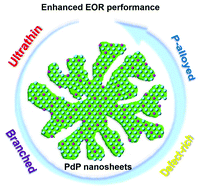许冬冬副教授、刘犇教授课题组在CHEMICAL COMMUNICATIONS发表研究论文
[ 1 ] Nanjing Normal Univ, Jiangsu Collaborat Innovat Ctr Biomed Funct Mat, Sch Chem & Mat Sci, Jiangsu Key Lab New Power Batteries, Nanjing 210023, Peoples R China
[ 2 ] Sichuan Univ, Coll Chem, Chengdu 610064, Peoples R China
CHEMICAL COMMUNICATIONS 2020,56, 15667-15670
Highly branched PdP nanosheets (NSs) rich in defects and with a thickness of similar to 3.2 nm were synthesized, for the first time, via a nanoconfined attachment growth mechanism inside assembled lamellar micelles. Owing to the synergistic structural (being a highly branched, ultrathin, and defect-rich material) and compositional (P-alloyed) advantages, the PdP NSs exhibited remarkable electrocatalytic activity (3.2 A mg(Pd)(-1)), a low reaction activation energy (16.0 kJ mol(-1)), good CO anti-poisoning ability, and electrocatalytic stability during the ethanol oxidation reaction (EOR) in alkaline conditions.

https://pubs.rsc.org/en/content/articlelanding/2020/CC/D0CC06725C#!divAbstract
版权与免责声明:本网页的内容由收集互联网上公开发布的信息整理获得。目的在于传递信息及分享,并不意味着赞同其观点或证实其真实性,也不构成其他建议。仅提供交流平台,不为其版权负责。如涉及侵权,请联系我们及时修改或删除。邮箱:sales@allpeptide.com